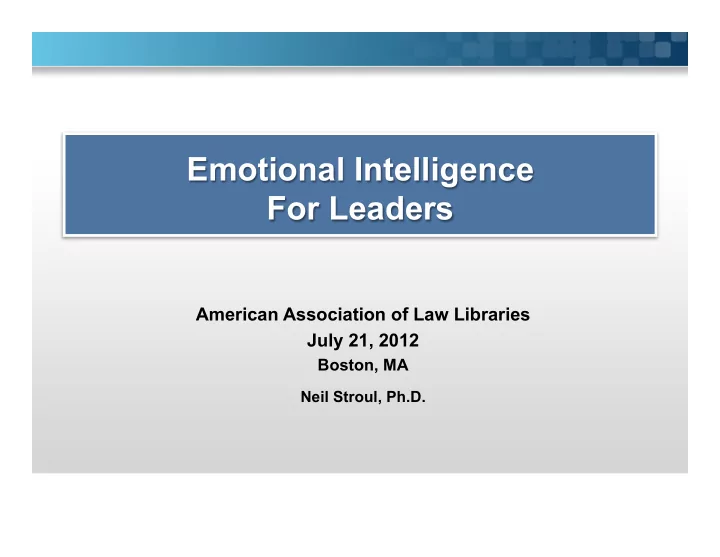

Emotional Intelligence For Leaders American Association of Law Libraries July 21, 2012 Boston, MA Neil Stroul, Ph.D.
Exceptional Leaders Describe 3 individuals in your life who are exceptional leaders along with the qualities/characteristics that make them exceptional. Individuals Qualities 1. 2. 3. 2
Exceptional Leaders (cont ’ d) Transcribe the Characteristics you listed onto Sticky-Notes 1 characteristic per Sticky-Note! Go to the appropriate flip chart and post them as being IQ, Technical or EQ based characteristics 3
The Three Domains of Competence Threshold Competencies 8 – 9% 8 – 9% Technical IQ Skills EQ accounts for Emotional Good news = more than twice Intelligence EQ can be IQ & Technical learned. Skills combined as a predictor of success! 4
Emotions Drive… Behavior Performance Emotions Leadership 5
What is Emotional Intelligence? In those fields I have studied, emotional intelligence is much more powerful than I.Q. in determining who emerges as a leader. I.Q. is a threshold competence - you need it, but it doesn't make you a star. Emotional intelligence can. - Warren Bennis 6
Emotional Intelligence Personal Social Competence Competence - Social Awareness - Self-Awareness - Relationship - Self-Management Management 7 Reference: Primal Leadership by Daniel Goleman, Richard Boyatzis, & Annie McKee
Emotional Intelligence (cont ’ d) § Self-Awareness - Emotional Self-Awareness - Accurate Self-Assessment - Self-Confidence 8
Emotional Intelligence (cont ’ d) § Self-Management - Emotional Self-Control - Transparency - Adaptability - Achievement - Initiative - Optimism 9
Johari Window 10
Emotional Intelligence (cont ’ d) § Social Awareness - Empathy - Organizational Awareness - Service 11
Emotional Intelligence (cont ’ d) § Relationship Management - Inspirational leadership - Influence - Developing others - Change catalyst - Conflict management - Teamwork and collaboration 12
Emotional Intelligence Model Behaviors – Emotional Self-Awareness Self-Awareness – Accurate Self-Assessment – Self-Confidence Self-Management – Emotional Self-Control – Transparency – Adaptability – Achievement – Initiative – Optimism Social Awareness – Empathy – Organizational Awareness – Service – Inspirational leadership Relationship – Influence Management – Developing others – Change catalyst – Conflict management – Teamwork and collaboration 13
LADDER OF INFERENCE I take Actions based on my beliefs The Reflective Loop (our beliefs affect I adopt Beliefs about the world what data we select next time) I draw Conclusions I make Assumptions based on the Memory meanings I added generates conditioned I add Meanings (cultural and personal) tendencies and cognitive I select “ Data ” from what I observe distortions Observable “data” and experiences (as a videotape record might capture it) 14
15
The Human Brain Neocortex � The part of the brain most recent in evolution is associated with complex thought. � Prefrontal Lobes � The brain’s executive center: integrates information from all parts of the brain and makes decisions to act. � Thalamus � Brain Stem � Amygdala � Processes sensory The most primitive part of the Triggers emotional responses. messages (e.g., eyes and brain. Is associated Typically gets signals from the ears) then routes them predominantly with automatic neocortex, but a quicker and mainly to the neocortex. � reflexes, as well as memory fuzzier signal comes directly from and learning. � the thalamus. Can hijack the brain when it perceives an emergency. � 16
Amygdala Hijack Key Characteristics of a Hijacking § Sudden – Unexpected § Taking you someplace you were not planning on going § Forceful § Against your will § You feel loss of control 17
“How Old are You in the Tough Moment?” � Emotional Triggers Take You � Back to Earlier Experiences � 18
Mindfulness § Explicit Memory (EM) – You are consciously aware of current event and historical trigger § Implicit Memory (IM) – You are not consciously aware of current event and historical trigger § Mindfulness involves transforming IM into EM 19
Learn your triggers § Disagreement § Disappointment § Disapproval § Rejection § Losing § Failure § Shame § Humiliation 20
Self-Management is about… § Shifting perspectives between the “ dance floor ” and the “ balcony ” § Pressing the “ pause button ” —noticing what is going on as it arises and pausing before acting § Mindfulness—practices that allow for reflection over triggered action 21
“ The real voyage of discovery consists not in seeking new landscapes but in having new eyes. ” Marcel Proust
Recommend
More recommend